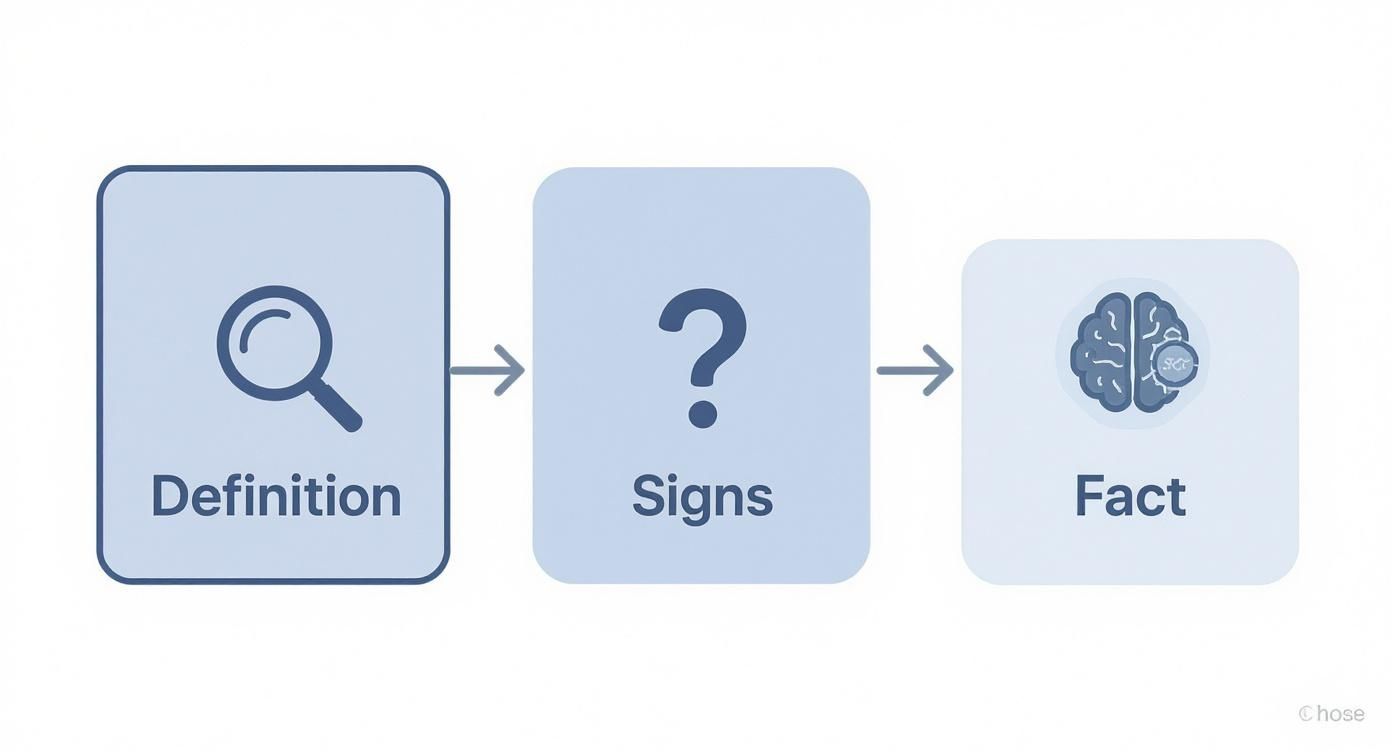Feeling like you’re not quite good enough is a deeply human experience. When these feelings are constant, learning how to overcome an inferiority complex starts with seeing these thoughts for what they are—just thoughts, not facts. Your journey begins by spotting this pattern and taking small, kind steps toward building genuine self-worth and resilience.
Understanding What an Inferiority Complex Is
Have you ever felt a knot in your stomach before speaking in a meeting, convinced your idea isn't good enough? Or perhaps you've scrolled through social media, feeling your own life seems dull in comparison. These moments can be signs of a deeper pattern: an inferiority complex.
While not a formal diagnosis, the term describes a persistent, gnawing feeling of inadequacy. It’s the inner voice that whispers you’re less capable or worthy than others, shaping your decisions, relationships, and overall well-being.
It's helpful to see this not as a personal failing, but as a learned pattern of thinking rooted in past experiences. Childhood criticism, social comparisons, or difficult times can create a mental filter that distorts how we see ourselves.
The Impact on Daily Life
Living with these feelings is exhausting and can create significant workplace stress. It might stop you from seeking a promotion or taking credit for your hard work, leading to burnout.
These feelings often spill into personal life, fueling social anxiety and making it hard to form genuine connections. If left unaddressed, these persistent thoughts can sometimes contribute to more serious mental health challenges like depression.
The infographic below breaks down the core elements of an inferiority complex, from what it is to its most common signs.

This visual guide unpacks a complex feeling into a mix of thoughts and behaviours. Simply recognising these signs in yourself is a powerful and compassionate first step toward change.
A Relatable Challenge in India
In India, intense pressure to succeed in academics and careers can create fertile ground for these feelings. A study on Indian college students found a direct link between feelings of inferiority and lower academic performance. You can read more about these findings about student challenges.
This shows that an inferiority complex is less about your actual abilities and more about your perception of them. Understanding this is key to improving your mental well-being.
The goal isn't to become perfect or banish self-doubt forever. It's about building resilience and self-compassion so you can manage these feelings without letting them run your life.
How to Challenge Your Inner Critic
We all have an inner voice that whispers doubts and criticisms. The first step in overcoming an inferiority complex is learning to gently challenge this internal narrative. You can learn to turn down its volume and reframe the self-talk that fuels feelings of inadequacy.

The techniques for doing this are simple and borrowed from well-established therapeutic approaches. With small, consistent efforts, you can build the mental resilience needed to quiet that critic and improve your overall well-being.
First, Just Notice the Critical Thought
Your first task is to catch your inner critic in the act, especially during moments of workplace stress or social anxiety. These thoughts often appear automatically, saying things like, "I’m going to fail this presentation," or, "Everyone here is smarter than me."
The key is to notice these thoughts without judging yourself for having them. This simple act of mindful awareness creates a small but vital space between the thought and your emotional reaction. Once you can spot these thoughts, you are ready to question them.
Now, Question and Reframe Your Thoughts
Once you've noticed a critical thought, it's time to examine it. Ask yourself: is this thought 100% true? Is there a kinder, more realistic way to see this situation? This isn't about forced positivity, but about finding a more balanced perspective.
For example, if your inner critic says, "I messed up that entire project," you can challenge it:
- Is that completely true? "No, most of the project went well. I made one mistake and I can learn from it."
- What’s a more helpful way to look at this? "Mistakes happen to everyone. This is a chance to improve for next time."
- What would I tell a friend? "I'd tell a friend that one error doesn't define their competence."
This reframing process helps break the cycle of automatic negative thinking that often drives anxiety and can contribute to depression.
By consistently examining your inner critic, you reduce its power. You start to see that critical thoughts are often distorted interpretations, not objective facts.
This shift in perspective is a cornerstone of building genuine self-worth.
Try Keeping a Thought Journal
To make this process more concrete, try keeping a thought journal. When you feel a strong negative emotion, pause and write down the situation, the automatic thought, and the feeling that followed. Then, consciously write a more balanced, alternative thought.
An entry might look like this:
- Situation: My manager gave me constructive feedback on my report.
- Automatic Thought: "I'm terrible at my job. I can't do anything right."
- Emotion: Shame, anxiety.
- Alternative Thought: "My manager is helping me grow. This feedback is about the work, not about me as a person."
This practice trains your brain to challenge these patterns more naturally over time. It's a practical tool to help you learn how to overcome an inferiority complex in the moments it matters most. Remember, this is about building new mental habits. If feelings feel too overwhelming, professional therapy or counselling can offer structured support. Assessments here are for informational purposes and not a substitute for a professional diagnosis.
Building a Foundation of Self-Compassion
Challenging your inner critic is important, but a gentler, more effective approach is to actively cultivate self-compassion. This means treating yourself with the same kindness and understanding you would offer a good friend. It is a shift from self-judgment to self-support that builds lasting resilience and improves well-being.

This change is fundamental to managing the pressures that can lead to workplace stress and anxiety. It helps you build a more supportive inner world, which is crucial for happiness.
Embrace Kindness Through Self-Compassion Breaks
When feelings of inadequacy arise, a self-compassion break can ground you in kindness. This brief, mindful pause is a simple yet powerful exercise you can do anywhere.
It is built on three core actions:
- Acknowledge Your Pain: Say to yourself, "This is a difficult moment." This validates your experience without judgment.
- Recognise Common Humanity: Remind yourself, "Feeling this way is part of being human. I am not alone in this." This connects you to a shared experience.
- Offer Yourself Kindness: Gently place a hand over your heart and say, "May I be kind to myself." The physical touch can be very calming.
These breaks can interrupt the downward spiral of negative self-talk. They are a practical way to soothe difficult emotions and prevent them from escalating into deeper feelings of anxiety or depression.
Celebrate Your Small Victories
When you're figuring out how to overcome an inferiority complex, focusing only on big goals can be overwhelming. Instead, shift your focus to celebrating small wins along the way. Every small act of courage—like speaking up in a meeting or reframing a negative thought—is a victory.
Acknowledging these small wins builds positive momentum and provides tangible proof of your progress. Each success, no matter how minor, reinforces your capability and helps build genuine self-belief.
Celebrating small wins builds a ladder to your larger goals, one sturdy rung at a time. This approach makes the journey feel more manageable and rewarding.
Cultivate Authenticity in a World of Comparison
In a world of curated online lives, it’s easy to fall into the comparison trap, a major source of workplace stress and unhappiness. The antidote is not to be better than others, but to be more authentically yourself.
Authenticity means aligning your actions with your core values and embracing your unique strengths. It's about understanding what truly matters to you, separate from external expectations.
Reflect on these questions to connect with your authentic self:
- What activities make you feel genuinely energised?
- When do you feel most like yourself, without any pretence?
- What values (like honesty, creativity, or kindness) are most important to you?
Living authentically reduces the need for external validation because your sense of worth comes from within. It’s a powerful step toward building true resilience and a deeper sense of well-being. Keep in mind that all assessments mentioned are for informational purposes only and are not a substitute for a professional diagnosis.
How Your Lifestyle Can Lift You Up
Our mental and physical health are deeply connected. The small choices you make every day—what you eat, how you move, and how well you rest—form the foundation of your mental resilience. Gentle, sustainable shifts in your lifestyle can be a powerful way to support yourself as you work to overcome feelings of inferiority.

This is not about a complete life overhaul or adding more pressure. It’s about making small, manageable changes that can genuinely reduce feelings of anxiety and protect against burnout.
Mindful Movement for a Calmer Mind
When you feel down, exercise might be the last thing on your mind. But mindful movement is about connecting with your body gently, which can be very effective for easing workplace stress. A brisk walk, simple stretches, or a few yoga poses can release feel-good chemicals in your brain.
These small actions help regulate your mood and build a stronger mind-body connection. The goal is to find joy in moving, which is a huge step for building self-compassion and boosting your overall well-being.
The Restorative Power of Sleep
Good sleep is essential for mental health. When you are tired, negative emotions can feel more intense, making you more vulnerable to anxiety and depression. A well-rested mind is better equipped to challenge the inner critic and handle stress.
Creating a simple pre-sleep routine can make a big difference.
- Limit Screen Time: Put devices away at least an hour before bed.
- Create a Calm Environment: A dark, quiet, and cool room promotes better sleep.
- Practice Relaxation: A few minutes of deep breathing or reading can help calm your mind.
Consistent, restful sleep is one of the most powerful tools for building emotional resilience.
Nourishing Your Body to Support Your Brain
The food you eat directly impacts your mood and brain function. A balanced diet rich in whole foods provides the stable energy and nutrients your brain needs to thrive.
You don't need a "perfect" diet to feel the benefits. Simply adding more fruits, vegetables, and lean proteins can help regulate your mood and lessen symptoms of anxiety, making a big impact on your well-being.
In the Indian context, basic needs like education can significantly shape self-worth, as research shows a link between illiteracy and feelings of inferiority. You can learn more about how education shapes self-perception and its impact. These lifestyle changes create a supportive environment for your mind and body to thrive, but remember that this information is for guidance, not diagnosis.
When to Seek Professional Support
Reaching out for professional help is an act of strength and self-care. While self-help tools and lifestyle changes are powerful, sometimes the weight of inadequacy is too heavy to carry alone. Recognising when you need support is a huge step toward lasting mental well-being.
If feelings of inferiority consistently interfere with your daily life, work, or relationships, it may be time to talk to someone. When these feelings contribute to persistent anxiety, cycles of depression, or overwhelming workplace stress, professional guidance offers structured support.
Recognising the Signs It’s Time for Support
It can be hard to tell the difference between a bad day and a deeper issue. Gently ask yourself if any of the following feel familiar, as they may indicate that professional support could be helpful.
- Feelings Are Overwhelming: You feel stuck in a loop of negative self-talk you can't break.
- Daily Functioning Is Affected: Your work performance is suffering, or you are avoiding social situations.
- Coping Mechanisms Are Unhealthy: You are relying on unhealthy habits to manage your feelings.
- You Feel Persistently Hopeless: A sense of hopelessness has become a constant companion.
These are not personal failings; they are signals that you are carrying a heavy load. A professional can help you unpack it in a safe, non-judgmental space.
What to Expect from Therapy and Counselling
The idea of therapy or counselling can feel intimidating, but the process is designed to be supportive. In a first session, a therapist aims to understand your experiences and goals. It is a collaborative space where you can share your story at your own pace.
The goal of therapy isn’t to "fix" you, because you are not broken. It is to provide you with personalised tools and new perspectives, empowering you to build the resilience needed to thrive.
In India, societal pressures can add another layer to these feelings. You can learn more about how this mindset can be addressed by fostering greater self-assurance. A culturally aware therapist can be invaluable in helping you explore these nuances.
Finding the Right Professional for You
Finding the right person is key to a successful therapeutic journey. It's important to work with someone you feel comfortable with, such as one of these Clinical and Counseling Psychologists. Look for qualified professionals with experience in self-esteem, anxiety, and cognitive-behavioural techniques.
Don't hesitate to have a brief initial chat with a potential therapist to see if their approach feels right. Think of it as an investment in your long-term happiness and well-being. Remember, the self-assessments and guidance in this article are informational and not a substitute for a professional diagnosis.
A Gentle Path Forward on Your Journey
The journey to move past an inferiority complex is a personal one, built on small, courageous steps. It is not a race to a flawless state of confidence, but rather a process of valuing progress over perfection. Every time you question a negative thought or offer yourself kindness, you are strengthening your foundation for mental well-being.
This path is about weaving these strategies into your daily life. It’s about questioning your inner critic, celebrating small wins, and nourishing your mind and body. Every effort, no matter how small, adds to your growing resilience.
Embracing the Gradual Process
Healing is rarely a straight line; you will have days when old feelings creep back in, and that's okay. These moments are not setbacks but opportunities to practice your new skills, like self-compassion or managing workplace stress.
Think of it like tending a garden. You plant seeds with new techniques, water them with consistent effort, and remain patient. This steady, consistent care helps your self-worth flourish over time. You might also find this external guide to building confidence to be a helpful companion.
Your Continued Growth
This process is proof that you can change your inner narrative. You have the power to shift from self-criticism to self-acceptance. If the journey feels too heavy to walk alone, remember that seeking professional support through therapy or counselling is a sign of incredible strength.
The most important takeaway is this: you are worthy of kindness, respect, and acceptance—especially from yourself. Every small step on this path is a victory for your long-term happiness and a testament to your strength.
Your Questions, Answered
As you work through these feelings, questions will naturally arise. Here are answers to some common ones, but remember, this is for informational purposes; it's always best to speak with a professional for personal advice.
Is an Inferiority Complex Just Low Self-Esteem?
That's a great question. While they are related, there is a subtle but important difference. Low self-esteem is a general feeling of not being good enough, whereas an inferiority complex is a more intense conviction that you are fundamentally behind everyone else.
It involves constant comparison and always finding yourself lacking. Working on your self-esteem is an excellent starting point for addressing feelings of inferiority.
Can I Really Get Over This on My Own?
For many, the answer is yes. Self-help strategies like practicing self-compassion, reframing negative thoughts, and making positive lifestyle changes build resilience. These practical tools can genuinely help you manage feelings of anxiety and workplace stress.
However, if these feelings are deeply ingrained, professional therapy or counselling can be highly effective. A good therapist provides a safe space and tailored strategies for lasting change.
How Long Until I Start to Feel Better?
There is no magic timeline, as everyone's journey is different. Some people notice small shifts within a few weeks, while for others, it may be a more gradual process. It’s all about unlearning old habits and building new, healthier ones.
Be patient and compassionate with yourself. Celebrate the small victories along the way—each one is a meaningful step toward breaking free from self-doubt and building a healthier relationship with yourself.
Your progress is not a race. It is a commitment to your own well-being, and every step is a powerful move in the right direction.
Ready to take the next step in your mental health journey? At DeTalks, we connect you with qualified therapists and provide science-backed assessments to guide you toward greater clarity and resilience. Find the right support for you today.

Leave a Reply